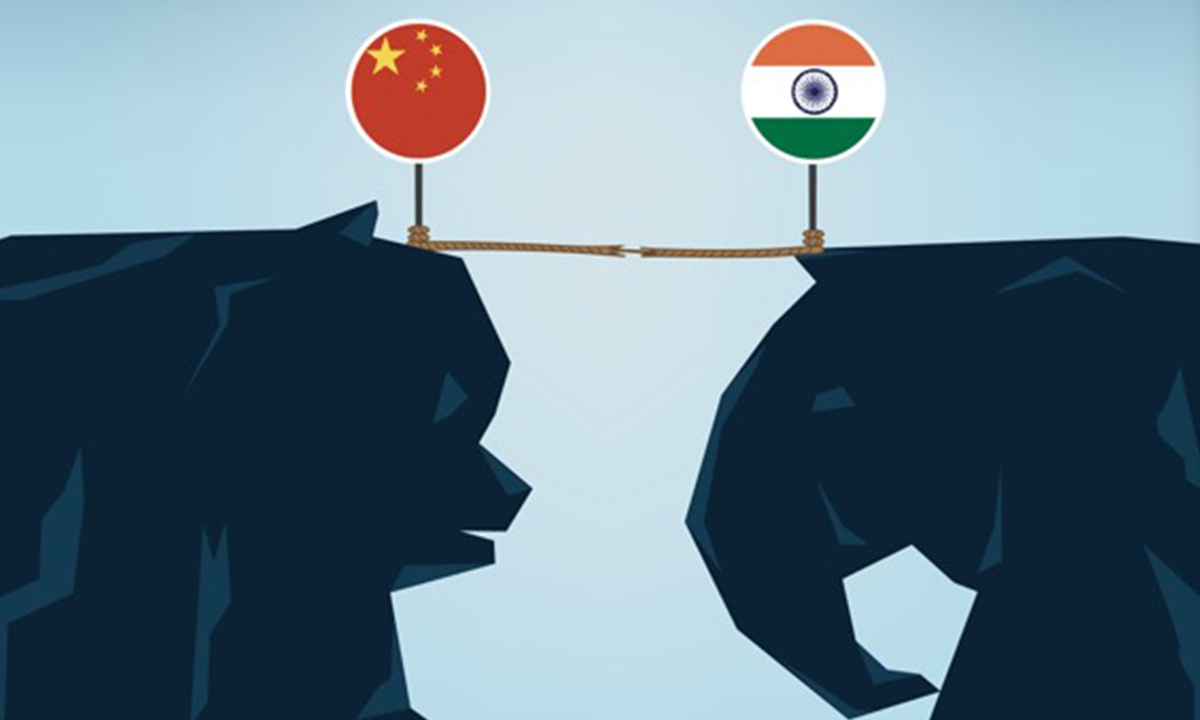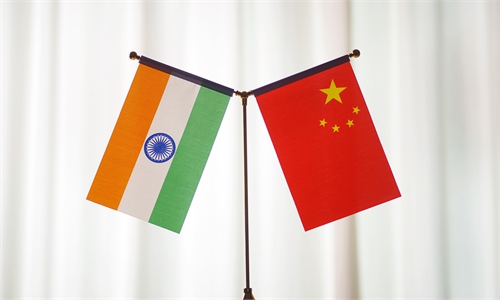What does 18th China-India Corps Commander Level Meeting indicate?: Global Times Editorial

Illustration: GT
The Chinese and Indian militaries held the 18th round of China-India Corps Commander Level Meeting on Sunday. According to the important common understanding of the leaders of both countries, the two sides held in-depth exchange of views on expediting the resolution of relevant issues. The Shanghai Cooperation Organisation defense ministers' meeting will be held soon in India. There is widespread anticipation that the defense ministers of China and India will meet on this occasion. Therefore, many analysts believe that the latest negotiations between the two militaries sent a positive signal and will create a good atmosphere for further high-level contacts between the two countries.
Since the border friction between China and India broke out in early May 2020, it has been going on for nearly three years. During this period, the two sides have held multiple high-level meetings, 18 Corps Commander Level talks, and several bilateral consultation and coordination meetings. At the same time, the two militaries achieved disengagement at four locations, including the Galwan valley. Although making breakthroughs is a difficult and slow process, the two sides have established a broad consensus through "marathon-style" negotiations, which is to promote the stabilization of the border situation through dialogue.
China and India have held the 18th round of China-India Corps Commander Level Meeting, which reflects that the two countries hope to maintain peace in the border areas and local stability along the Line of Actual Control (LAC). Both countries are not interested in escalating conflicts or even confrontations, and are instead seeking to put the border issue under control.
Indeed, this common wish of the two sides has been the mainstream during the past three years. China-India border situation have further eased this year, and the two countries have also shown more goodwill on issues including bilateral relations, creating a good atmosphere and conditions for more progresses in border negotiations.
In addition, the fact that the talks between the Chinese and Indian militaries have been going on for so long without a big breakthrough also indicates the high complexity and difficulty in resolving the border dispute. Recently, some foreign media outlets claimed that China does not seem to be eager to solve the problem. It needs to be said that this is not a matter of rush, because being anxious does not help solve the problem.
Negotiations require the two sides to meet each other halfway, otherwise it is impossible to achieve results. It needs to be emphasized that opportunistic tendencies during negotiations are of no help in resolving the issue.
Some in India may have such an illusion and misjudgment: As China is being fully contained and suppressed by the US while India is being heavily courted by Western countries, it's India that holds more bargaining chips, and China that "needs India." They even fantasize about a "negotiation result" in which China unconditionally concedes. Such unrealistic expectations also put pressure on the Modi government.
Washington is clearly leaning toward India, trying to provoke and escalate China-India conflicts. Not only have US media reported that intelligence agencies got involved, but politicians in the Congress have also started to interfere in, "affirming" India's stand on the disputed territory issue, and think tanks have suggested bringing the territorial disputes between China and India into the scope of their so-called Indo-Pacific Strategy. To be frank, these actions by the US are like sugar-coated poisons for India. While this so-called support may seem to give India some "momentum" in the short term on the border issue, Washington, which is good at using offshore balancing to provoke conflicts for profit, will actually lead New Delhi into a dangerous situation that is not in line with its own interests.
To be honest, this deserves India's high vigilance. It should not be fooled by a few sweet words from the Americans and raise their demands in negotiations with China, which would disrupt the overall situation of China-India relations. The China-India relationship needs to be restored to a normal diplomatic state as soon as possible, which is not only beneficial to both countries but also meets the widespread expectation of the international community. India has always seen itself as a bridge between North and South countries, and in this year's G20 theme, India has also put issues of concern to developing countries, such as global economic recovery, access to COVID-19 vaccines, food security and climate change, onto the agenda. On these global issues, India and China have similar positions, and the two populous countries sincerely working together can produce an effect of "one plus one greater than two."
In short, the content of the China-India relationship is broad and rich, and should not be tied to or constrained by border frictions. The problems considered thorny in the Western world perhaps can be solved by Eastern wisdom. We look forward to China and India setting an example in this regard.

